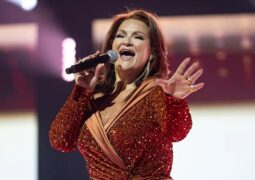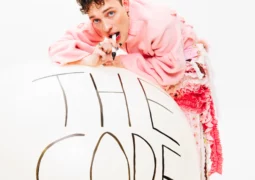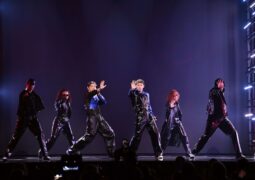The fifth esctoday.com TOP TEN list starts today with the places 7 and 6 being announced. As announced on Saturday, this week's topic are the TOP TEN longest-running spin-offs and imitations.
The list features shows and contests that are either real spin-offs of the Eurovision Song Contest organised by the EBU or contests that follow a similar idea.
So we continue:
No. 7 – Junior Eurovision Song Contest (2003-present)
Since 1990, all contestants in the Eurovision Song Contest have to be at least 16 years of age. To give younger musicians a chance to present their songs, the Junior Eurovision Song Contest was launched in 2003. The rules are partly different from the big one: All songs may last up to 2 minutes and 45 seconds and in the early years, all songs had to be written by children. Since 2008, adults have been being allowed to take part in the writing process. The performers on stage have to be aged between 10 and 15 years. Between 2003 and 2006, all contestants were not allowed to have released any music commercially before their participation. The voting format is the same as in the Eurovision Song Contest with each country giving 12, 10 and 8-1 points to its top ten. However, since 2005, all countries receive 12 points automatically to avoid a "nil points" result. Furthermore, the winning country is not automatically determined to host the show the year after. So far, 28 countries have competed at least once. The contest with the most participating countries was 2004 with 18 countries taking part. In 2009, the number of participants dropped to an all-time low of 13.
Some of the contestants enjoyed fame after their participation in the Junior Eurovision Song Contest. 2004 winner María Isabel scored an international hit with her entry Antes muerta que sencilla as it was a hit in many European countries. Among others, it reached number six in the French charts but it also reached the charts in countries that were not even taking part, like Switzerland and Germany. 2005 winner Ksenia Sitnik from Belarus is still famous in her home country and she has released two albums to date. The Tolmachovy Twins, who won the contest for Russia in 2006, opened the first semi final of the Eurovision Song Contest 2009 in Moscow. Sweden was represented by by the three Sandén sister Molly, Frida and Mimi on three occassions, who frequently appear on Swedish television.
Molly Sandén is also one of the few contestants who also have a connection to the Eurovision Song Contest as she competed (and finished last) in the final of Melodifestivalen 2009. Marios Tofi represented Cyprus in JESC 204 and later finished second in the Cypriot national final for the Eurovision Song Contest 2006. Weronika Buchat represented Poland in the junior contest in 2004 as part of the group KWAdro and this year, the was a backing singer for Poland in the big one. Many of the hosts had or would have a connection to the big contest: Danish songwriter Remee co-hosted the first Junior Eurovision Song Contest in Copenhagen in 2003 and he would later co-write the German entry in the Eurovision Song Contest 2008, Disappear, finishing equal last. Nadia Hasanoui co-hosted the show in Lillehammer in 2004 and she would later co-host the Eurovision Song Contest in Oslo in 2010. The 2009 contest was co-hosted by Ani Lorak, who had represented Ukraine in the Eurovision Song Contest 2008.
María Isabel with her 2004 winning song for Spain:
No. 6 – World Popular Song Festival (1970-1989)
The World Popular Song Festival, also known as Yamaha music festival, was held between 1970 and 1989 and it was often referred to as the "Oriental Eurovision". Unlike the Eurovision Song Contest, it was a world wide contest that all countries were eligible to participate in. A total of 64 countries have taken part at least once, among them some European countries that had never taken part in the Eurovision Song Contest at that time: Czechoslovakia, East Germany, Hungary, Iceland, Romania, Poland and Bulgaria. The Soviet Union also took part once. The only continent with very few participations was Africa, as only two African countries ever took part (Nigeria once and South Africa five times). All 20 editions of the contest were held in Tokyo and different awards were given out with the "Grand Prix" being the main prize. In 1988, the winners were not decided and in 1989, there was no voting at all as the show was only considered a charity concert. In 1990, the contest was cancelled for good.
Many famous singers and bands have taken part in the World Popular Song Festival. Among them are acts like Tina Charles (winner 1978), Bonnie Tyler (winner 1979), Demis Roussos, Bryan Adams, A Taste of Honey, Stevie Wonder, Jean-Paul Cara, Kiki Dee, LaToya Jackson and Kylie Minogue. There was also a VERY high number of Eurovision Song Contest participants who also took part in the Yamaha music festival. Among them are many winners like Céline Dion, Bucks Fizz, Udo Jürgens, Marie Myriam and Anne-Marie David. ABBA competed under their real names in 1972 but were already eliminated in the semi final round with the song Santa Rosa.
Former or future Eurovision Song Contest representatives are (separated by the country they represented in the Yamaha music festival:
| Country |
Artist |
Year |
| Austria | Waterloo & Robinson | 1975 |
| Udo Jürgens | 1981 | |
| Belgium | Nicole & Hugo | 1974 |
| Ann Christy | 1974 | |
| Robert Cogoi | 1976 | |
| Claude Lomabrd | 1979 | |
| Emly Starr | 1980 | |
| Stella | 1982 | |
| Sandra Kim | 1986 | |
| West Germany | Peter Horten | 1972 |
| Joy Fleming | 1973 | |
| Baccara | 1977 | |
| Nicole | 1983 | |
| Czechoslovakia | Karel Gott | 1977 |
| Denmark | Olsen Brothers | 1974, 1977 |
| Finland | Markku Aro | 1973 |
| Marion Rung | 1976 | |
| France | Frida Boccara | 1970 |
| Martine Clémenceau | 1971 (winner), 1977 | |
| Anne-Marie David | 1973 | |
| Caline | 1975 | |
| Cathérine Ferry | 1976 | |
| Noelle Cordier | 1979 | |
| Marie Myriam | 1981 | |
| Céline Dion | 1982 | |
| Annick Thoumazeau | 1984 | |
| Greece | Elpida | 1972, 1974 |
| Anna Vissi | 1978 | |
| Cleopatra | 1985 | |
| Ireland | Cathal Dunne | 1975 |
| Red Hurley | 1976 | |
| Géraldine (Luxembourg 75) | 1978 | |
| Israel | Gali Atari | 1971, 1976 |
| Ilanit | 1974 | |
| Italy | Dori Ghezzi | 1972 |
| Bobby Solo | 1975 | |
| Gianni Morandi | 1976 | |
| Mia Martini | 1977 | |
| Toto Cutugno | 1980 | |
| Al Bano & Romina Power | 1980 | |
| Matia Bazar | 1984 | |
| Raf | 1988 | |
| Malta | Mary Spiteri | 1975 |
| Monaco | Mary Christy | 1976 |
| Netherlands | Ben Cramer | 1972, 1975 |
| Maywood | 1979 | |
| Norway | Ellen Nikolaysen | 1974 (winner) |
| Benny Borg | 1979 | |
| Kate Gulbrandsen | 1986 | |
| Portugal | José Cid | 1971, 1975 |
| Romania | Dida Dragan | 1974 |
| Spain | Betty Missiego | 1977 |
| Braulio | 1982 | |
| Sweden | Ann Christy | 1971 |
| ABBA (as Benny, Björn…) | 1972 | |
| Switzerland | Peter, Sue & Marc | 1971, 1972, 1974 |
| Véronique Müller | 1976 | |
| Piera Martell | 1977 | |
| Turkey | Ajda Pekkan | 1977 |
| United Kingdom | Géraldine | 1976 |
| Bucks Fizz | 1981 | |
| Yugoslavia | Vice Vukov | 1970 |
This list would be even longer if national final participants had been taken into account.
If you want to learn more about this contest, a great source can be found here.
Video clip of the 1972 Swedish entry Santa Rosa:
http://www.youtube.com/watch?v=K4ji7Mj2AQw
Tomorrow, no. 5 and 4 on the list will be revealed.




